- Home
- Will Hobbs
Take Me to the River
Take Me to the River Read online
TAKE ME
TO THE
RIVER
WILL HOBBS
to the kids of Terlingua School
Contents
Cover
Title Page
Chapter 1 - Those Were His Exact Words
Chapter 2 - The Bloody Bend
Chapter 3 - Burger Night at the Starlight
Chapter 4 - Underwhelmed
Chapter 5 - Kissed by an Assassin
Chapter 6 - Take Me to the River
Chapter 7 - Good-bye, Good Luck!
Chapter 8 - Uh, I Don’t Think So
Chapter 9 - A Little Side Trip into Mexico
Chapter 10 - The Wax Makers
Chapter 11 - The Point of No Return
Chapter 12 - The Coyote’s Story
Chapter 13 - Flossing with Cane
Chapter 14 - We’re in the Big-Time Now
Chapter 15 - Hello, Dolly
Chapter 16 - It Was All a Lie
Chapter 17 - Good Morning, Texas
Chapter 18 - You Can’t Get There from Here
Chapter 19 - Ready, Boys?
Chapter 20 - What Did You Do That For?
Chapter 21 - Bad at Any Level
Chapter 22 - The Deal Goes Down
Chapter 23 - What the Chopper Saw
Chapter 24 - The D-Word
Chapter 25 - Bringin’ It All Back Home
About the Author
Books by Will Hobbs
Copyright
About the Publisher
Chapter 1
Those Were His Exact Words
HOLD YOUR HORSES, I told myself. If you fly off the bus like a rabid bat, they’ll turn and run.
Two plane rides and three and a half hours on a Greyhound bus, through the emptiest, most sunburned landscape I’d ever seen, and I was closing in on the town of Alpine, Texas. Alpine is where my cousin and my uncle were picking me up. There wasn’t any bus service down to Terlingua, in the Big Bend, where my mother’s long-lost brother made his living as a river guide.
West Texas was a thousand miles farther from home than I had ever been. I’d come all this way to paddle the fabled Rio Grande with Uncle Alan and his son, my cousin Rio. I’d never met them before, but in my imagination they had always loomed larger than life.
Strange to say, my mother hadn’t seen Uncle Alan since the year before Rio was born, and Rio was now fifteen. Her excuse? “Too many scorpions out there.”
My uncle’s excuse for never coming to visit us in North Carolina? Mom was sketchy on that one. I got the idea it was too expensive for him, or else he thought so little of civilization, he preferred to stay home with the scorpions.
The bus rolled on, and Alpine came into view across the high desert plain. I had pretty well guessed that the town’s surroundings weren’t going to look that much like the Swiss Alps. But Alpine did have mountains of a sort—scattered, scaly, and cactus clad. Pronghorn antelope were grazing below a billboard for the High Desert Hotel, which is where I would get off.
I soon had the hotel in my sights. I scanned the sidewalk and the front steps for my cousin and my uncle. I had a pretty good idea what they looked like from their annual Christmas card. “Greetings from Terlingua,” it always said, over a recent picture of the two of them, canoe paddles in hand, alongside the Rio Grande. The invitation for me to come out and run the river with them came three years ago, but my parents weren’t the sort to rush into things. My dad joked that if I was going to go out into the world to slay dragons, I should be of dragon-slaying age and trained in swordsmanship. Which meant that I had to wait until I was fourteen, with two years of canoe camp under my belt.
They must be waiting inside the hotel lobby, I told myself as I stepped from the air-conditioned bus into the searing heat of mid-July. Local time was six PM. I was right on the money.
Backpack and duffel bag collected, I made for the High Desert’s lobby. No relatives. No big deal, I told myself, they’re in a nearby grocery store. A week on the river meant twenty-one meals. Rounding up all those groceries was taking longer than they thought it would.
The lobby was deserted with the exception of a stuffed mountain lion and a rail-thin old man under a Stetson hat who rose from behind the counter to greet me. He might’ve been pushing ninety, with parchment skin, a nose like a hawk’s beak, and piercing blue eyes. “With your permission,” I said, “I just got off the bus, and I’d like to wait in your lobby. My relatives said to meet them here. They’re on their way to Alpine to pick me up.”
“Where from?” His voice was raspy and demanding.
“Terlingua. It’s about eighty miles from here, down close to the Mexican border.”
“Terlinguans are different,” the old man said with attitude.
I already knew that, but given his tone, I wasn’t going to admit it. To my way of thinking, that was the whole appeal. My cousin hadn’t grown up like me and practically every other kid in the country. In the Age of Connectedness, my cousin and my uncle were about as unconnected as you can get. They didn’t have a phone, and unbelievably, they didn’t even have a computer. My mother liked to say they lived under a rock. I guess my uncle did at one time, literally. There was always a grin on Mom’s face when she spoke of me going out west one day to dig them up.
What I said back to the old-timer was, “I wouldn’t know if they’re different, sir, I haven’t met any.”
“Take my word for it,” he insisted.
It seemed like we had reached an impasse. I took my leave, set my duffel bag in a corner, and headed over with my backpack toward the couch and the coffee table for what I hoped would be a short wait.
The breeze stirred by the paddles of the overhead fan felt good, and the leather couch was comfortable. For a couple of impatient minutes my eyes triangulated from the front door, to my watch, to the eyes of the mountain lion lounging on a waist-high slab of burl wood across the room. From where I sat the big cat kept staring at me. Those eyes might have been made of glass, but they were making me nervous.
Maybe to avoid the mountain lion’s predatory gaze, I grabbed for the newspaper on the coffee table. THREE HEADLESS BODIES FOUND IN THE RIO GRANDE, the headline read.
Well, I thought, that’s not so good.
The dateline read Rio Bravo, Mexico, which reminded me that Bravo was my cousin’s middle name. I didn’t know much about the Rio Grande, but this much I’d picked up back home: Rio Bravo del Norte—Brave River of the North—is the Mexican name for the Rio Grande.
The article was only a couple of paragraphs long and added little to the splashy headline. The bodies had been discovered just the day before, and the murders were presumed to be the work of Mexico’s vicious drug cartels. What I wanted to know was the location of this town of Rio Bravo. Was it in the Big Bend or anywhere close to it? I considered asking my friend behind the desk but thought better of it. Rio and his dad would know.
Sighting a computer at a table in the corner of the lobby, I checked in with my parents while the emailing was easy. I decided against mentioning the headline in the local paper. Uncle Alan had already assured them that the violence they’d been hearing about along the Rio Grande hadn’t come anywhere close to the Big Bend. It was either way upstream, especially around the city of Juárez, or way downstream, closer to the Gulf of Mexico. Terlingua’s river companies were running trips as usual through the canyons of the Big Bend.
What I emailed my parents was that I’d made it to Alpine and was expecting Rio and Uncle Alan any minute.
As I was finishing up with shout-outs to my younger sisters and brother, the phone was ringing behind the hotel desk. I heard the scratch of the old man’s voice as he took the call. Just then some rowdy Texans emerged from the restaurant
behind the lobby and drowned out all other sound. By the time they passed through onto the street, the old guy was off the phone. “Your name Dylan Sands?” he called.
“Yes, sir,” I volunteered, “that would be me.”
He beckoned me over. “That was your cousin calling. Left a message for you.”
“They running late?”
“Not exactly. Said you should hitchhike down there.”
“Hitchhike? You have to be kidding.”
“Son, those were his exact words.”
“What was his explanation?”
“No explanation. Oh, and one other thing. Look him up at the Starlight.”
“What’s that?”
“The Starlight Theatre is what he’s talking about.”
“Meet him at a theater?”
“It used to be one back in the mining days. That was before the market for mercury went bust and Terlingua went to ruin. The fellow who bought the ghost town put a new roof over the walls of the old theater and turned it into a restaurant.”
“Did my cousin leave a callback number?”
“Nope, sure didn’t.”
“Did he know I was sitting right here in the lobby?”
“Sure did. I told him you was right here.”
“Hmmm . . . ,” I said.
Chapter 2
The Bloody Bend
HITCHHIKE EIGHTY MILES THROUGH the desert . . . were they kidding?
I had to make a quick decision. It was nearly six thirty and I was burning daylight. Hitchhiking in the dark would be totally insane.
Better get going, I decided. My cousin and my uncle thought I could do it. Why no explanation, though?
With a quick stop at a convenience store for directions, I muttered my way five blocks east and a couple south. I planted myself beside the road sign to Big Bend National Park and Terlingua Ghost Town. Make sure to check out the driver, I reminded myself. No ax murderers. After three or four minutes a car headed my way. I stuck out my thumb, and it felt weird. This was my first time. The car passed me by.
It was seven minutes in the scorching heat before another vehicle appeared, a four-door, fire-engine-red Silverado pickup with a slide-in camper. The truck and the camper both looked new. The large man behind the wheel tilted his sunglasses and leaned forward. He studied me intently and slowed a little. He was thinking about it.
No deal—his foot was back on the gas. I gave him a forlorn smile tinged with desperation. Just then I remembered I’d forgotten to stick my thumb back out.
Thumb or no, his brake lights went on, and the truck pulled to the shoulder. I grabbed my stuff, sucking wind as I approached the back of his rig. The Texas plate—NOBEANS—wouldn’t be difficult to remember. When the state trooper who found me mangled in a ditch asked if I could recall the license plate, it would be right on my lips.
“Did Dylan have any dying words?” I could hear my mother asking.
“Yes, ma’am, he did—‘No beans.’”
As I came up alongside the truck, the driver lowered his window. Big guy with a round face, extra chin, and a red chili pepper on his baseball cap. His salt-and-pepper beard looked like thorny cactus needles. I didn’t get a look at his eyes. His sunglasses were the mirror type favored by people with something to hide. If I lived long enough to estimate his age for the police, I would say sixty-plus. He had a belly on him, under a T-shirt that pictured a sombrero-wearing, guitar-strumming frog. Over the mariachi frog it said VIVA TERLINGUA!
With a grin, the driver said through the window, “I take it you’re hitching.” His accent had quite a twang to it, like he’d walked out of a cowboy movie.
“Yes, sir,” I replied. He seemed friendly, but I’d had zero experience with ax murderers.
“Well, throw your stuff in the backseat and hop in before you melt!”
I did as I was told, and we headed down the road. “Nice rig,” I said.
The driver groaned. “Nice rig to drive to the poorhouse. I bought it right before gas prices spiked.”
“I’m glad you haven’t turned the AC off for better mileage. It sure is warm out there.”
“Hotter than a billy goat in a pepper patch, and hotter yet the closer we get to the Rio Grande. Between Alpine and the river, you drop three thousand foot.”
My driver reached across to shake hands. “L.B. Cannon out of Killeen, Texas. Call me L.B.”
I took his hand and coughed up my name. He guessed from my accent I was from eastern Tennessee, maybe Knoxville. I told him he wasn’t far wrong. I was from western North Carolina, Asheville to be exact. He asked if I was headed to Terlingua and I told him I was, to look up my cousin and my uncle. Cannon gathered that this was my first time in West Texas and I told him it was. “But you’ve seen it in the movies,” he said.
“Maybe, but not that I can think of. It looks like the far side of the moon.”
“No Country for Old Men—did you see that one?”
“Heard of it.”
“How about There Will Be Blood?”
“Heard of that one, too. My folks aren’t too keen on violent movies.”
“Violent they are, but that’s true to the Big Bend, or the Bloody Bend, as it’s been called.”
Cannon reached for a can of chew on the console between us. “Nasty habit,” he confessed as he stuck a plug between his cheek and gum. “If I’m lucky, my ticker will give out before the Big C gets me.”
I asked L.B. if he was retired and he said he was. “Retired six years ago, after my better half passed away. I’ve been driving the blue highways ever since. Keep coming back to the Big Bend. I’m a history buff, and there’s no place like it for history and scenery as far as I’m concerned. How old are you, anyway?”
“Going on fifteen.”
“We used to call that fourteen,” he said with amusement. “I’d be remiss if I didn’t tell you that hitchhiking is a risky business at any age, but at fourteen, it’s just plain stupid. Your parents in on this?”
“No way,” I told him. “My mother would skin me alive.” I gave him a short history of my predicament and was wrapping up as Cannon slowed to a crawl for a Border Patrol checkpoint. We weren’t going to have to wait in line. We were the only vehicle on the road.
I figured they were going to stop us, but they merely eyeballed us and waved us on through.
“I guess there’s no reason to check people heading toward Mexico,” I remarked.
“Oh, but there is,” Cannon snorted. “For a hundred years and more, smuggling has gone both directions. These days, people and drugs are smuggled north, and the cash that comes from that trade is smuggled south, into the pockets of the Mexican traffickers. So are the weapons—mostly automatic weapons—that the drug cartels use to slaughter anybody that gets in their way. My camper could’ve been stuffed to the gills with AK-47s and millions in cash!”
“How come they didn’t stop us then, and search?”
Cannon lowered his window and hawked a stream of chew, then answered my question with undisguised sarcasm. “They didn’t stop us because we didn’t fit the profile. The way we look. This sort of thing gravels me no end. The president of Mexico had the courage to go to war with the cartels, but he can’t compete with their weaponry and the big money they use to bribe the authorities. He’s begging us to stop the flow of money and weapons south, and I just got waved through? Based on what I look like and the rig I’m driving? Does that make any sense to you?”
“Not hardly.”
Now was the time to bring up that headline in the local paper about the three headless guys. L.B. Cannon would know where the town of Rio Bravo was located. I asked, and he said it was “down in the valley,” far downstream.
“I’m happy to hear it. I was afraid it was in the Big Bend.”
“So far, so good when it comes to the Big Bend. The violence has been upriver, around Juárez, and downriver, in the Rio Grande Valley.”
“Why not in the Big Bend, L.B.?”
“Ever see that
NASA composite photo of the earth at night?”
“I can’t say that I have.”
“A dark patch indicates very little human activity. The Big Bend is part of the Chihuahuan Desert, one of the darkest areas in North America. We’re talking about a vast area with very few people on either side of the river. The bad guys shy away from places that remote. Hard to do business—they would be too exposed. It’s easier for them to operate in the cover of towns and cities.”
“Makes sense, but I’d steer clear just based on this desert.”
“People like your uncle and his boy, you gotta hand it to ’em. You really have to want to live here. The landscape might be beautiful, but it’s also brutal. Look how sharp the rocks are, and near about everything that grows here is out to get you.”
Cannon warmed to the subject of the bizarre-looking vegetation I was seeing out the window. In no time he had me calling out the names, like giant dagger yucca, sotol, mesquite, and creosote bush. He also pointed out landmarks as we passed them by: Double Diamond Ranch, Cathedral Mountain, Calamity Creek Wash, Butcherknife Hill, Nine Point Mesa, Fizzie Flat, Camel’s Hump, the Christmas Mountains.
We were more than an hour into the drive without having passed through a town of any description. No gas stations, virtually no buildings other than a few double-wide trailers. My cousin Rio lived beyond the rim of the known world.
The sky was spectacular, with thunderheads trailing dry rain. It was so dry out here the rain actually evaporated before it hit the ground. With another bend in the road, a new mountain range soared from the desert floor. This one was so high, clouds were snagging on its tall trees and stone towers and pinnacles. This range was like one gigantic fortress, its battlements lit up by the most glorious rainbow I had seen in my life. “Unbelievable,” I muttered. “What are those mountains called?”

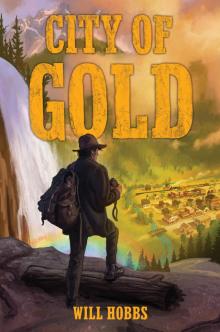 City of Gold
City of Gold Kokopelli's Flute
Kokopelli's Flute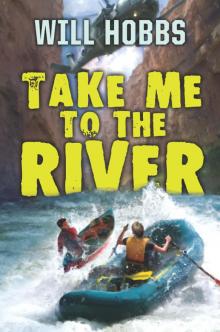 Take Me to the River
Take Me to the River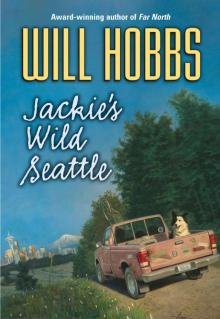 Jackie's Wild Seattle
Jackie's Wild Seattle The Maze
The Maze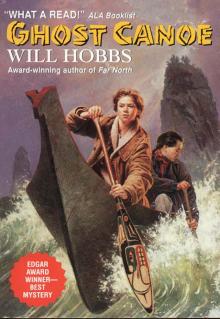 Ghost Canoe
Ghost Canoe Never Say Die
Never Say Die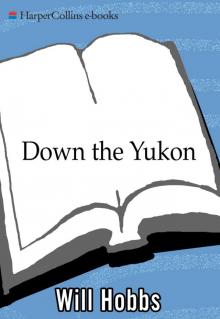 Down the Yukon
Down the Yukon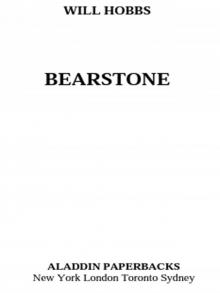 Bearstone
Bearstone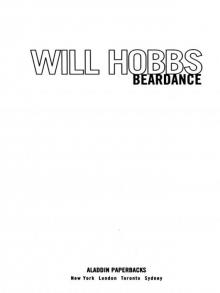 Beardance
Beardance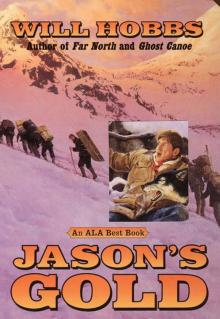 Jason's Gold
Jason's Gold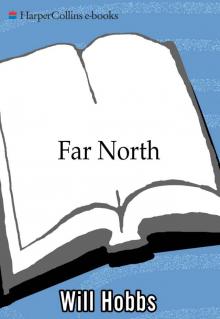 Far North
Far North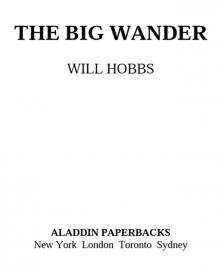 The Big Wander
The Big Wander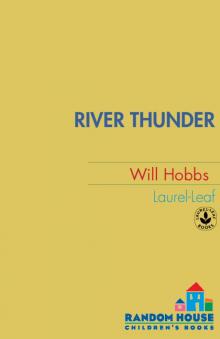 River Thunder
River Thunder Downriver
Downriver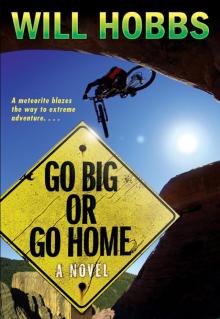 Go Big or Go Home
Go Big or Go Home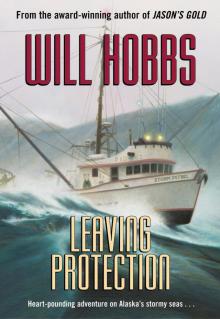 Leaving Protection
Leaving Protection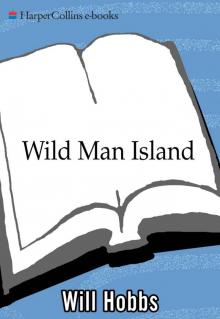 Wild Man Island
Wild Man Island